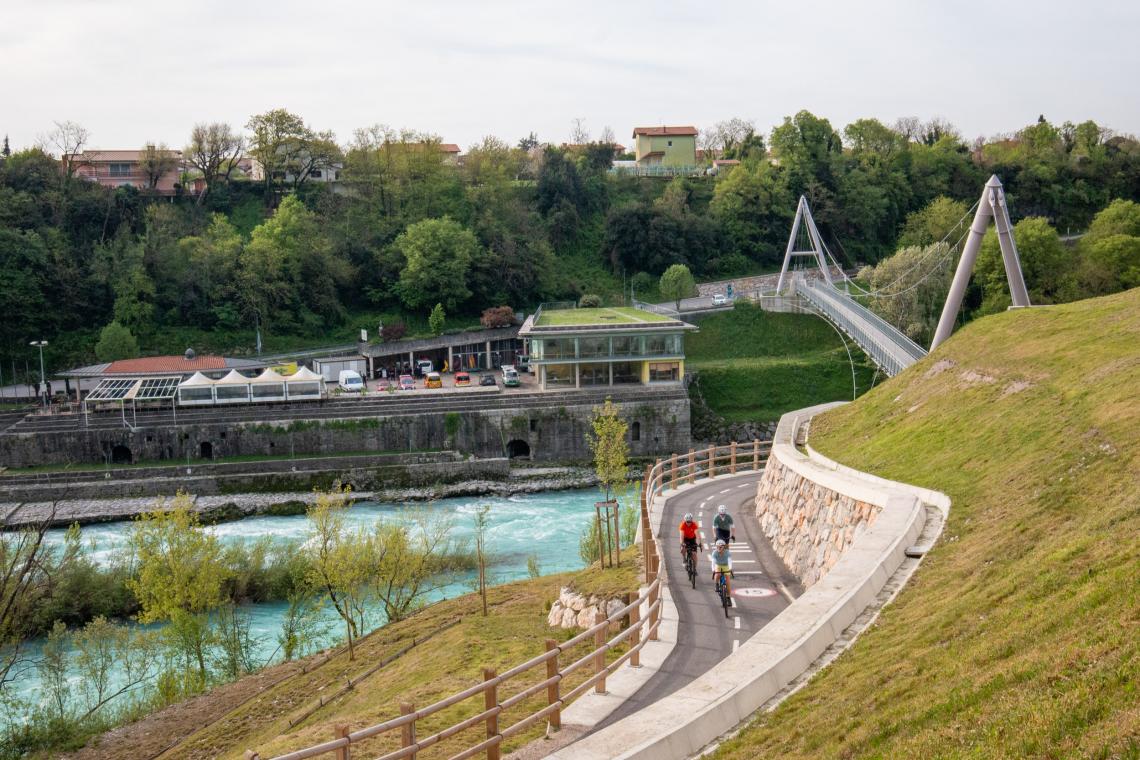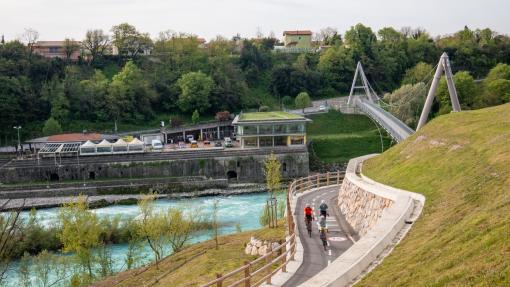The partners of the cross-border Inter Bike III project dealing with cycle tourism, Interreg VI-A Italy-Slovenia Programme 2021-2027, organized the final conference on Tuesday 16 September 2025 in Ajdovščina. As part of the project, a new cross-border cycling product, the Alpina Mediterranean Cycle Route, was developed. Two experimental summer bus routes for transporting bicycles have also been introduced between Ajdovščina and Cividale del Friuli and between the Vipava Valley and Predmeja, a solar-powered electric boat for the transport of passengers and bicycles has been created and runs in the Caorle Lagoon and on the Lemene River and finally a study on public passenger transport has been prepared for the Coastal-Karst region (Obalno-Kraška).
Inter Bike III is the third project in the series of the same name started in 2011. The third project focused on transferring the good practices of the two previous projects to the hinterland of the Upper Adriatic. A new cycling product, the Alpina Mediterranean Cycle Route, has been developed connecting the new areas of the Torre and Natisone Valleys and the Brkini. The two partners of the project, the Municipality of Ilirska Bistrica and the Local Action Group Torre Natisone, have identified the route that connects three countries, Italy, Slovenia and Croatia, and joins the Alpe-Adria Cycle Route (Salzburg-Grado).
The 300 km Alpina Mediterranean Cycle Route starts from Venzone and crossing Cividale del Friuli continues towards Slovenia where it passes through the Isonzo Valley, across the Karst and the Brkini, to end in Kvarner, in Opatija. The track can be downloaded from the website Alpina Mediterranean Cycle Route, available on the updated web platform www.bike-alpeadria.eu. The Municipality of Ilirska Bistrica is responsible for promoting the route. In summer 2025, two experimental BiciBus lines were introduced - one cross-border between Ajdovščina and Cividale del Friuli and the other local between the Vipava Valley and Predmeja, with the aim of promoting experiential and climate tourism. The two services have brought added value to the new tourism product.
A private body Caorle.IT participated in the project for the first time, which commissioned the construction of an electric boat for the transport of passengers and bicycles in the Caorle Lagoon and along the Lemene river towards Concordia Sagittaria. The boat docks at the pier in the town of Cavanella, whose construction was also co-financed within the project. It is the first autonomous boat in the area, as it obtains electricity from the solar panels installed on the boat.
Also within the framework of Inter Bike III, particular attention was paid to the training of tour operators and the active involvement of territorial stakeholders in a co-design process. Through meetings in the Torre and Natisone Valleys area, work was done on the definition of a structured tourism product. This participatory approach guarantees that the proposals truly comply with the needs of the territory and respond to visitor expectations, enhancing local specificities and promoting shared management of tourist opportunities.
Three new charging stations for electric bicycles have been installed in the Municipality of Ilirska Bistrica. Visitors can also take advantage of bicycle rental at the tourist information centers of Ilirska Bistrica and San Pietro al Natisone and at the rental point in the center of Portogruaro.
In the Coastal-Karst region, a regional study on public passenger transport on buses and railways was carried out which, based on the analysis of bus and railway lines, offers recommendations for improvements. The main conclusions highlighted an insufficient number of both bus and rail lines, the lack of connections between urban centers and the hinterland, the absence of integrated tickets for different types of transport and applications to monitor arrivals and departures in real time, the need for buses equipped for people with reduced mobility and the lack of bus lines for bicycle transport. Recommendations for improvements will be communicated to local authorities and the State so that changes can be effectively introduced.
The partners in the new territories are very satisfied with the results of the project. In Ilirska Bistrica they stress that a unique tourism product will contribute to the coordinated development of the Alpina Mediterranean Cycle Route, which has so far been developed in every country at local level. According to the Torre Natisone GAL, cycle tourism is configured as a real driving force for growth, capable of strengthening cohesion between territories and generating new opportunities for economic, cultural and social development. The experience gained through the Interbike III project represents a solid foundation on which to build further initiatives and innovative routes.
The partnership also invited three similar projects from the Interreg VI-A IT-SI Programme, Adrioncycletour, Kras-Carso II and CycleProMotion, to the closing event. Stafania Franzot from the Autonomous Region of Friuli-Venezia Giulia, the lead partner of the Adrioncycletour project, explained that the strategic project is based on the guidelines of the EUSAIR strategy, which promotes interregional cooperation and the creation of a corridor for sustainable mobility. It will be used to establish a future cycle route between the countries along the Adriatic-Ionian coast. Aleš Vodičar from the Municipality of Sežana and Ana Hrast from the Kras and Brkini Regional Development Agency highlighted the main objective of the Kras-Carso II project, which is to establish a management structure for the cross-border geopark in the form of a European grouping for territorial cooperation and to register the park in the UNESCO geoparks network. In the CycleProMotion project, which is just getting started, they plan to develop a joint strategy for promoting the Gorenjska, Northern Primorska, and Friuli-Venezia Giulia regions. They will also establish a network of four smart charging stations.
At the end of the meeting, Tjaša Maurič from the Posoški razvojni center (Posoški Development Center) and Lana Sladič from the Idrijsko-Cerkljanska razvojna agencija (Idrija-Cerkno Development Agency) presented the activities of the Regional Mobility Center of Northern Primorska, which aims to become a platform for cooperation in the region.
Photo: Solkan, Matevž Hribar - GoodPlace


